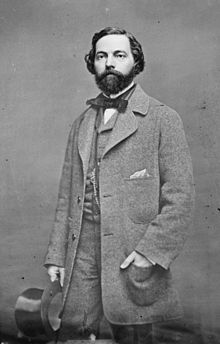William Porcher Miles | |
|---|---|
 | |
| Member of the C.S. House of Representatives from South Carolina's 2nd district | |
| In office February 18, 1862 – March 18, 1865 | |
| Preceded by | New constituency |
| Succeeded by | Constituency abolished |
| Deputy from South Carolina to the Provisional Congress of the Confederate States | |
| In office February 4, 1861 – February 17, 1862 | |
| Preceded by | New constituency |
| Succeeded by | Constituency abolished |
| Member of the U.S. House of Representatives from South Carolina's 2nd district | |
| In office March 4, 1857 – December 24, 1860 | |
| Preceded by | William Aiken |
| Succeeded by | Christopher Bowen |
| 36th Mayor of Charleston | |
| In office November 7, 1855 – November 4, 1857 | |
| Preceded by | Thomas Leger Hutchinson |
| Succeeded by | Charles Macbeth |
| Personal details | |
| Born | July 4, 1822 Walterboro, South Carolina |
| Died | May 11, 1899 (aged 76) Ascension Parish, Louisiana |
| Resting place | Green Hill Cemetery, Union, West Virginia |
| Political party | Democratic |
| Spouse |
Betty Beirne (m. 1863) |
| Alma mater | Charleston College |
| Signature | |
| Military service | |
| Allegiance | |
| Branch/service | |
| Years of service | 1861 |
| Rank | |
| Battles/wars | American Civil War |
William Porcher Miles (July 4, 1822 – May 11, 1899) was an American politician who was among the ardent states' rights advocates, supporters of slavery, and Southern secessionists who came to be known as the "Fire-Eaters." He is notable for having designed the most popular variant of the Confederate flag, originally rejected as the national flag in 1861 but adopted as a battle flag by the Army of Northern Virginia under General Robert E. Lee[1] before it was reincorporated.
Born in South Carolina, he showed little early interest in politics, and his early career included the study of law and a tenure as a mathematics professor at the Charleston College from 1843 to 1855. In the late 1840s, as sectional issues roiled South Carolina politics, Miles began to speak up on sectional issues. He opposed both the Wilmot Proviso and the Compromise of 1850. From then on, Miles would look at any northern efforts to restrict slavery as justification for secession.
Miles was elected as mayor of Charleston in 1855 and served in the United States House of Representatives from 1857 until South Carolina seceded, in December 1860. He was a member of the state secession convention and a representative from South Carolina at the Confederate Convention in Montgomery, Alabama, which established the provisional government and constitution for the Confederate States. He represented his state in the Confederate House of Representatives during the American Civil War.
- ^ Geoghegan, Tom (August 30, 2013). "Why do people still fly the Confederate flag?". BBC News. Retrieved October 30, 2013.